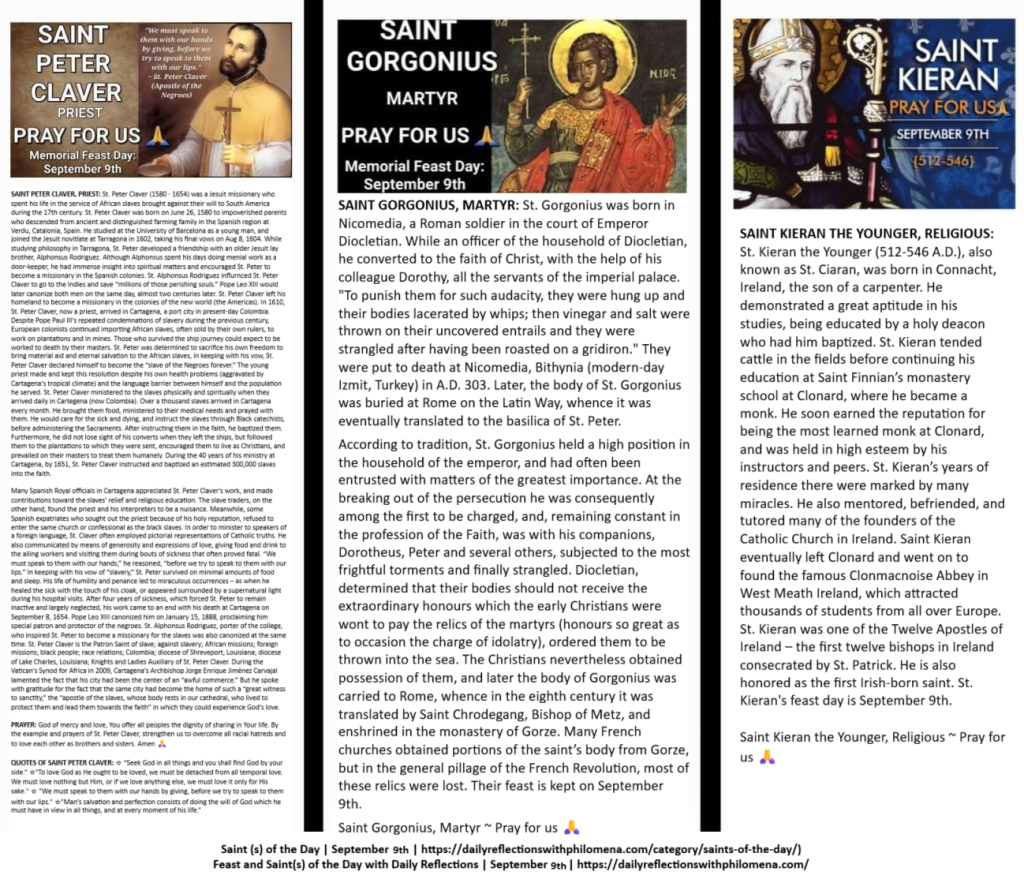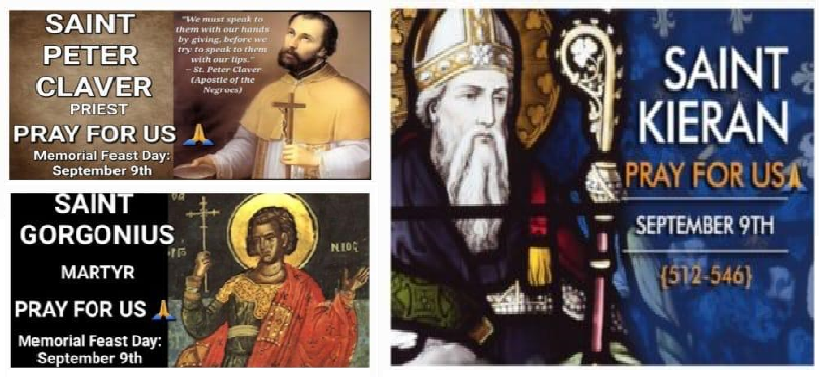
MEMORIAL OF SAINT PETER CLAVER, PRIEST; SAINT GORGONIUS, MARTYR AND SAINT KIERAN THE YOUNGER, RELIGIOUS ~ FEAST DAY: SEPTEMBER 9TH: Today, we celebrate the Memorial of Saint Peter Claver. Priest; Saint Gorgonius, Martyr and Saint Kieran the Younger, Religious. Through the intercession of our Blessed Mother Mary and the Saints on this feast day, we humbly pray for the victims of human trafficking and for an end to human trafficking and modern-day slavery around the world. We pray for the sick and dying, especially those who are physically and mentally ill, and those suffering from cancers and other terminal diseases. We pray for the poor and needy and for peace, love, and unity in our marriages, our families, and our world. And we continue to pray for our Holy Father, the Bishops, the Clergy, for vocations to the priesthood and religious life, for the Church, for persecuted Christians, for the conversion of sinners, and Christians all over the world…. Amen🙏
SAINT PETER CLAVER, PRIEST: St. Peter Claver (1580 – 1654) was a Jesuit missionary who spent his life in the service of African slaves brought against their will to South America during the 17th century. St. Peter Claver was born on June 26, 1580 to impoverished parents who descended from ancient and distinguished farming family in the Spanish region at Verdu, Catalonia, Spain. He studied at the University of Barcelona as a young man, and joined the Jesuit novitiate at Tarragona in 1602, taking his final vows on Aug 8, 1604. While studying philosophy in Tarragona, St. Peter developed a friendship with an older Jesuit lay brother, Alphonsus Rodriguez. Although Alphonsus spent his days doing menial work as a door-keeper, he had immense insight into spiritual matters and encouraged St. Peter to become a missionary in the Spanish colonies. St. Alphonsus Rodriguez influrnced St. Peter Claver to go to the Indies and save “millions of those perishing souls.” Pope Leo XIII would later canonize both men on the same day, almost two centuries later. St. Peter Claver left his homeland to become a missionary in the colonies of the new world (the Americas). In 1610, St. Peter Claver, now a priest, arrived in Cartagena, a port city in present-day Colombia. Despite Pope Paul III’s repeated condemnations of slavery during the previous century, European colonists continued importing African slaves, often sold by their own rulers, to work on plantations and in mines. Those who survived the ship journey could expect to be worked to death by their masters. St. Peter was determined to sacrifice his own freedom to bring material aid and eternal salvation to the African slaves, in keeping with his vow, St. Peter Claver declared himself to become the “slave of the Negroes forever.” The young priest made and kept this resolution despite his own health problems (aggravated by Cartagena’s tropical climate) and the language barrier between himself and the population he served. St. Peter Claver ministered to the slaves physically and spiritually when they arrived daily in Cartegena (now Colombia). Over a thousand slaves arrived in Cartagena every month. He brought them food, ministered to their medical needs and prayed with them. He would care for the sick and dying, and instruct the slaves through Black catechists, before administering the Sacraments. After instructing them in the faith, he baptized them. Furthermore, he did not lose sight of his converts when they left the ships, but followed them to the plantations to which they were sent, encouraged them to live as Christians, and prevailed on their masters to treat them humanely. During the 40 years of his ministry at Cartagena, by 1651, St. Peter Claver instructed and baptized an estimated 300,000 slaves into the faith.
Many Spanish Royal officials in Cartagena appreciated St. Peter Claver’s work, and made contributions toward the slaves’ relief and religious education. The slave traders, on the other hand, found the priest and his interpreters to be a nuisance. Meanwhile, some Spanish expatriates who sought out the priest because of his holy reputation, refused to enter the same church or confessional as the black slaves. In order to minister to speakers of a foreign language, St. Claver often employed pictorial representations of Catholic truths. He also communicated by means of generosity and expressions of love, giving food and drink to the ailing workers and visiting them during bouts of sickness that often proved fatal. “We must speak to them with our hands,” he reasoned, “before we try to speak to them with our lips.” In keeping with his vow of “slavery,” St. Peter survived on minimal amounts of food and sleep. His life of humility and penance led to miraculous occurrences – as when he healed the sick with the touch of his cloak, or appeared surrounded by a supernatural light during his hospital visits. After four years of sickness, which forced St. Peter to remain inactive and largely neglected, his work came to an end with his death at Cartagena on September 8, 1654. Pope Leo XIII canonized him on January 15, 1888, proclaiming him special patron and protector of the negroes. St. Alphonsus Rodriguez, porter of the college, who inspired St. Peter to become a missionary for the slaves was also canonized at the same time. St. Peter Claver is the Patron Saint of slave; against slavery; African missions; foreign missions; black people; race relations; Colombia; diocese of Shreveport, Louisiana; diocese of Lake Charles, Louisiana; Knights and Ladies Auxiliary of St. Peter Claver. During the Vatican’s Synod for Africa in 2009, Cartagena’s Archbishop Jorge Enrique Jiménez Carvajal lamented the fact that his city had been the center of an “awful commerce.” But he spoke with gratitude for the fact that the same city had become the home of such a “great witness to sanctity,” the “apostle of the slaves, whose body rests in our cathedral, who lived to protect them and lead them towards the faith” in which they could experience God’s love.
PRAYER: God of mercy and love, You offer all peoples the dignity of sharing in Your life. By the example and prayers of St. Peter Claver, strengthen us to overcome all racial hatreds and to love each other as brothers and sisters. Amen 🙏
QUOTES OF SAINT PETER CLAVER: ☆ “Seek God in all things and you shall find God by your side.” ☆”To love God as He ought to be loved, we must be detached from all temporal love. We must love nothing but Him, or if we love anything else, we must love it only for His sake.” ☆ “We must speak to them with our hands by giving, before we try to speak to them with our lips.” ☆”Man’s salvation and perfection consists of doing the will of God which he must have in view in all things, and at every moment of his life.”
SAINT GORGONIUS, MARTYR: St. Gorgonius was born in Nicomedia, a Roman soldier in the court of Emperor Diocletian. While an officer of the household of Diocletian, he converted to the faith of Christ, with the help of his colleague Dorothy, all the servants of the imperial palace. “To punish them for such audacity, they were hung up and their bodies lacerated by whips; then vinegar and salt were thrown on their uncovered entrails and they were strangled after having been roasted on a gridiron.” They were put to death at Nicomedia, Bithynia (modern-day Izmit, Turkey) in A.D. 303. Later, the body of St. Gorgonius was buried at Rome on the Latin Way, whence it was eventually translated to the basilica of St. Peter.
According to tradition, St. Gorgonius held a high position in the household of the emperor, and had often been entrusted with matters of the greatest importance. At the breaking out of the persecution he was consequently among the first to be charged, and, remaining constant in the profession of the Faith, was with his companions, Dorotheus, Peter and several others, subjected to the most frightful torments and finally strangled. Diocletian, determined that their bodies should not receive the extraordinary honours which the early Christians were wont to pay the relics of the martyrs (honours so great as to occasion the charge of idolatry), ordered them to be thrown into the sea. The Christians nevertheless obtained possession of them, and later the body of Gorgonius was carried to Rome, whence in the eighth century it was translated by Saint Chrodegang, Bishop of Metz, and enshrined in the monastery of Gorze. Many French churches obtained portions of the saint’s body from Gorze, but in the general pillage of the French Revolution, most of these relics were lost. Their feast is kept on September 9th.
Saint Gorgonius, Martyr ~ Pray for us 🙏
SAINT KIERAN THE YOUNGER, RELIGIOUS: St. Kieran the Younger (512-546 A.D.), also known as St. Ciaran, was born in Connacht, Ireland, the son of a carpenter. He demonstrated a great aptitude in his studies, being educated by a holy deacon who had him baptized. St. Kieran tended cattle in the fields before continuing his education at Saint Finnian’s monastery school at Clonard, where he became a monk. He soon earned the reputation for being the most learned monk at Clonard, and was held in high esteem by his instructors and peers. St. Kieran’s years of residence there were marked by many miracles. He also mentored, befriended, and tutored many of the founders of the Catholic Church in Ireland. Saint Kieran eventually left Clonard and went on to found the famous Clonmacnoise Abbey in West Meath Ireland, which attracted thousands of students from all over Europe. St. Kieran was one of the Twelve Apostles of Ireland – the first twelve bishops in Ireland consecrated by St. Patrick. He is also honored as the first Irish-born saint. St. Kieran’s feast day is September 9th.
Saint Kieran the Younger, Religious ~ Pray for us 🙏
